POETS Seminar, ENVISION, Seek to Get Grad Students Hooked on Outreach
April 26, 2017
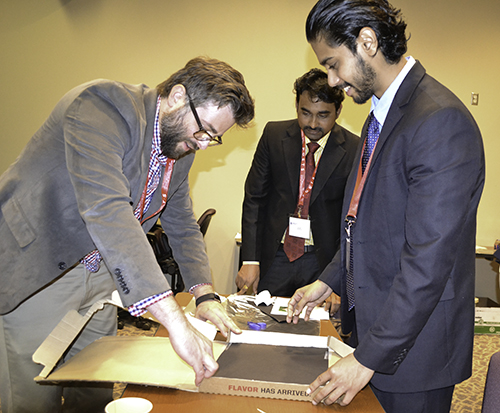
A team of POETS graduate students build a pizza box solar oven during the recent POETS grad student outreach seminar.
The objective of the contest? To use a pizza box to build a solar oven capable of heating up a marshmallow to the hottest temperature possible during a 10-minute time span. But in a room full of 50 or so competitive and talented engineering grad students on campus for POETS' 2nd annual NSF Site Visit, the challenge wasn’t so much the design itself. It was about finishing first and getting one of the coveted, optimal spots in front of a limited number of lights! However, for those in charge of the April 19th Student Outreach Seminar, the more salient objectives were 1) to help create T-shaped graduate students (with depth of expertise in their field plus technical and professional breadth), and 2) to replicate their own love of outreach in the participating grad students—with the goal of increasing the number of youngsters exposed to STEM in the future.
Part of the POETS (Power Optimization for Electro-Thermal Systems) Engineering Research Center’s 2-day NSF Site Visit, the seminar, "STEM Outreach: A Supplement to Your Research Skill Set," which served grad students from the four POETS universities, "was originally held because graduate students voiced a desire to be more involved with STEM outreach," explains POETS Associate Director of Education & Inclusivity, Jessica Perez. Helping her lead the seminar were Matt Milner, Malia Kawamura, and James Carpenter, board members of ENVISION, Illinois' Engineering graduate student group, whose main thrust is outreach.
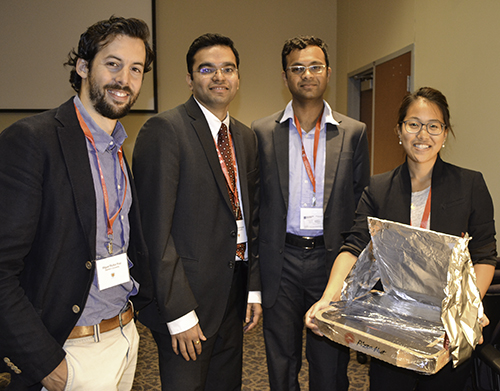
The winning team shows the design that got them the W.
The main purpose of the event was not just to underscore that outreach is important, but to give participants a taste of how fun and rewarding outreach can be.
Opening the session, Perez stressed the importance of outreach, then reviewed what STEM outreach looks like and why grad students should get involved. She also shared about POETS' goal of creating T-shaped graduate students. Perez explains it as "depth of expertise in their chosen discipline, as well as technical breadth and professional breadth. Professional breadth includes leadership skills, entrepreneurship, systems thinking, scientific communication skills, teaching experience, management skills, etc."
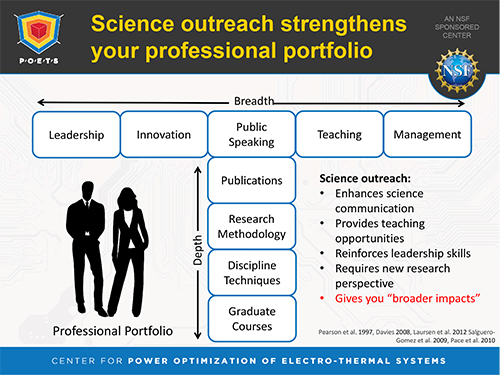
Above is Perez's slide about how STEM outreach helps to shape POETS' T-shaped graduate students.
While Perez says grad students can gain professional breadth by TAing for a course, or gain management skills by running multiple research projects with multiple players, she says that's not enough.
“Graduate students often find gaps in the skills sets that are required for their future job,” she admits. So POETS is trying to provide activities and resources to help students “fill in the gaps.”
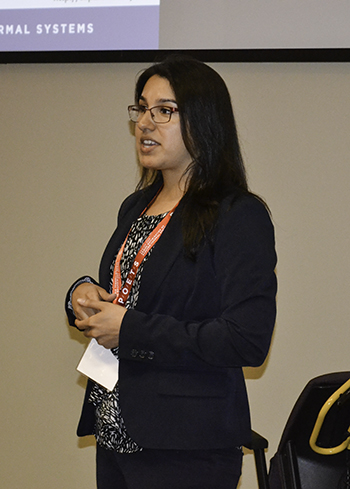
Jessica Perez, POETS' Associate Director of Education & Inclusivity, presents during the recent Student Outreach Seminar.
STEM outreach can help students build their professional skills set, Perez explains: “STEM outreach enhances scientific communication skills and provides teaching opportunities. It reinforces leadership skills and requires a new perspective on their research."
According to Perez, being able to communicate about your research is key: "If you can explain why your research is important to a 5th grader, you can do the same for someone interested investing in your company or research group.”
Perez then gave students resources to help them get involved with outreach at their institutions. Plus, the hands-on activity which followed exemplified the kinds of STEM outreach activities they could do and was designed “to give them a jump start in getting involved with outreach.”
The idea was to give the students a hands-on activity they could replicate at some future K–12 outreach in their home institution. So ENVISION President and co-founder Matt Milner, along with his cohorts, exposed seminar participants first-hand to an activity ENVISION originally did at a summer camp for middle school students: building marshmallow-heating solar ovens from pizza boxes.
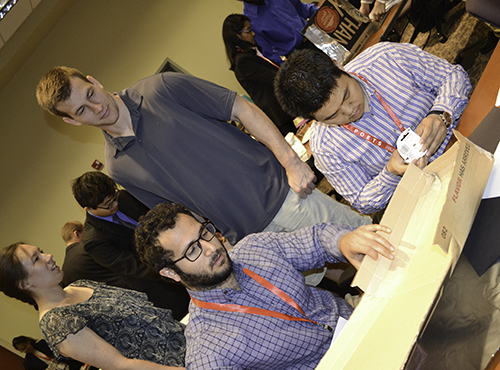
Left to right: ENVISION's Malia Kawamura and Matt Milner watch as a team builds their solar oven.
Teams of grad students were to build solar ovens from pizza boxes, aluminum foil, etc., then place their completed oven in front of one of the lights. The fly in the ointment? There were only a few lights, and, according to Milner, some might work better than others, so speed, efficiency (and some luck) were of the essence. The ovens were exposed to the lights for approximately ten minutes (or longer, depending on how long it took teams to finish), then tested using Infrared thermometers to see whose marshmallow had gotten the hottest. (For the record, the winner reached 127° Farenheit.)
While the ovens were basking in the light, Milner shared about how ENVISION was started, then encouraged the students to get involved in outreach in their own areas. He suggested that if their home institutions had no grad student outreach group, they should start one. He even gave them permission to borrow their name, an acronym formed from the words outlining their purpose (Engineers Volunteering In STEM EducatION), and logo.
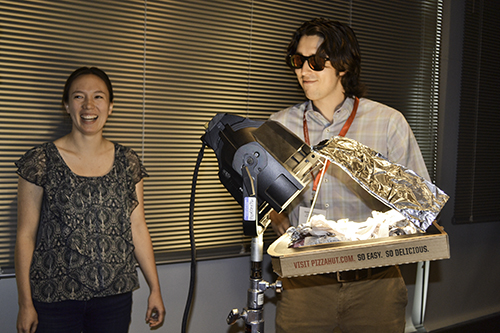
Left to right: ENVISION Vice President Malia Kawamura watches as one member of a team finds an optimal spot for their solar oven.
Milner reports that ENVISION, which he and Ashley Armstrong began in Spring 2016, has grown and is becoming interdisciplinary. Initially comprised of MechSE grads, the organization now has around 30 active members from all engineering fields. They're even branching out into other sciences, like chemistry, and entomology. “So getting a lot of crossover,” says Milner.
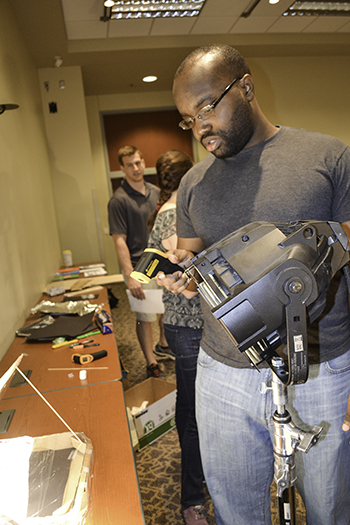
Right: ENVISION's James Carpenter measures the temperature of each team's marshmallow with an Infrared thermometer.
According to Milner, he and his cohorts agreed to do the POETS seminar in order to enlist allies in their quest to recruit more kids into STEM.
“I think it's important to not only give outreach, but also teach others. Because you can kind of multiply that power if you teach others to do outreach. And if you can instill in them a desire to want to do it, then you can reach that many more kids, which is what it's all about—to get more kids interested in the STEM fields and get them ready for future careers.”
Milner shares his STEM outreach educational philosophy: “Give kids exposure. Let them see these things and let their natural curiosity kind of just take over. Because when you make them curious, and you make them want to learn, they will learn. And if you give them that desire, then, I mean, if you make it their own idea, then you don't have to force them to do it!”
Also helping with the event was Malia Kawamura, the Vice President of ENVISION. A second year grad student in POETS PI Andrew Alleyne’s lab (possibly another incentive to participate in the event?), Kawamura was hopeful that “the grad students can see how much fun and rewarding and impactful STEM outreach can be, in the same way that I've been able to experience that and see that.”
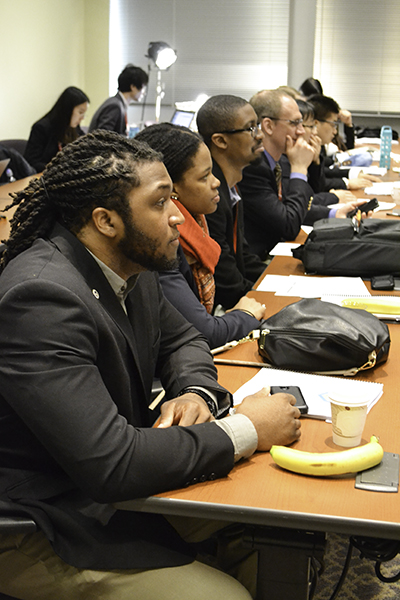
POETS grad students listen to a presenter during the Seminar
Another ENVISION officer who helped with the seminar, Treasurer James Carpenter, is a MechSE first-year grad student in Professor Nenad Miljkovic's lab, which has at least one POETS-funded project. He took part in order to engage his fellow engineering students with the important task of recruiting kids to STEM.
Carpenter's goal was “to hopefully convince the grad students of the importance of outreach and engaging the K–12 youth in STEM activities, to convince them to go in the STEM field, because there's a projected disparity in our workforce. So the purpose is to convince them that they can help encourage young people to go into these fields, so that we can be as competitive as possible as a nation.”
While he hoped that they had fun doing the solar oven marshmallow experiments, his plan was to “convince them of the importance, and make them as excited as I am about STEM outreach.”
What kind of impact did the seminar have on grad students? Perez reports that, at beginning of the activity, the students were very casual about their designs, "but once they saw the timer go up on the projector, they all stepped into high gear. They got creative. They came up with designs outside the bounds of the activity handout. The room became energetic and was full of collaborative, competitive conversations."
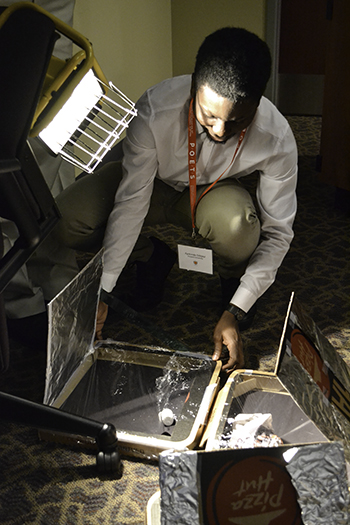
A graduate student jockeys for position in front of one of the lights.
In fact, she indicates that the students were so engaged that at one point, the POETS industry advisory board, who was holding a meeting next door, had to send someone over to tell them to keep the volume down because the noise was carrying over into the next room. So it appears that the Seminar leaders had successfully communicated their passion for outreach.
Story and photographs by Elizabeth Innes, Communications Specialist, I-STEM Education Initiative.
For I-STEM articles about POETS and ENVISION, see:
- POETS, New NSF Center at Illinois Poised to Revolutionize Electro-Thermal Systems
- POETS Seeks to Change the Attitudes, Shape of Students in STEM Pipeline
- POETS REU Helps Illinois Undergrad Sabrina Yin Choose Her Career Path
- MechSE Grads Milner & Armostrong Trade in Sports Outreach for STEM Via ENVISION
More: Externally Funded Projects, POETS, Science Centers, 2017
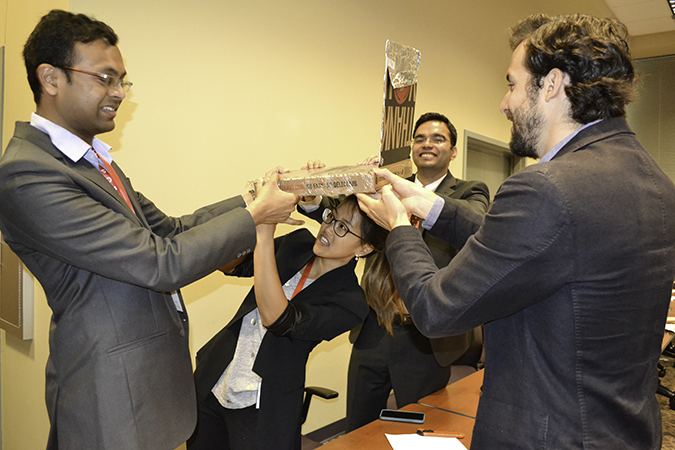
The eventual winners of the contest went to great lengths to complete their solar oven.













.jpg)
















